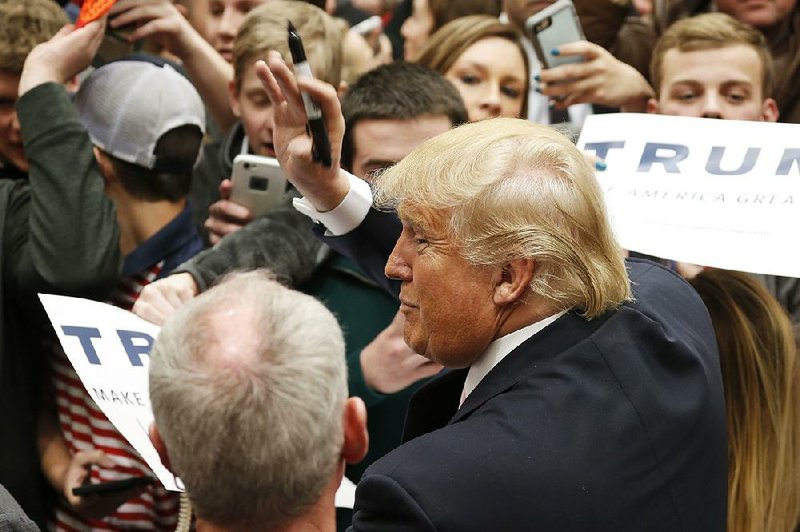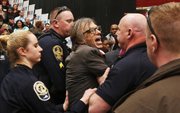VALDOSTA, Ga. -- On the eve of today's primaries, presidential hopefuls darted throughout the South and New England on a sprint before the day with the single biggest delegate haul yet.
FULL ELECTION COVERAGE
A new divide emerged between Republicans who pledge to fall in line behind Donald Trump if he wins their party's nomination and others who insist they can never back the businessman, and Democratic candidate Hillary Clinton turned her focus from her immediate rival, Bernie Sanders, to Trump.
Nebraska's Ben Sasse, a rising star among conservatives, became the first current U.S. senator to publicly raise the prospect of backing a third-party option if Trump clinches the nomination. In a letter posted on Facebook late Sunday, Sasse urged Republicans to consider whether a party led by Trump would still represent their interests.
"If our party is no longer working for the things we believe in -- like defending the sanctity of life, stopping Obamacare, protecting the Second Amendment, etc. -- then people of good conscience should stop supporting that party until it is reformed," he wrote.
The Associated Press asked Republican senators and governors across the country if they would support Trump if he secured the nomination. Just under half of those who responded would not commit to backing him, foreshadowing a potential break this fall.
The concern among Republican leaders appeared to grow after Trump's refusal to immediately disavow former Ku Klux Klan leader David Duke's support.
Mitt Romney, the party's 2012 nominee, called that "disqualifying." And South Carolina Gov. Nikki Haley, campaigning in Atlanta alongside Sen. Marco Rubio of Florida, said she would "not stop fighting a man who refuses to disavow the KKK."
Trump blamed a "lousy earpiece" and a misunderstanding for failing three times to condemn the former KKK leader in a CNN interview.
Trump said Monday in an interview on NBC's Today Show that he has never met white supremacist Duke, who voiced backing for Trump on his radio program recently and praised him for "taking on the Jewish establishment."
Trump said he thought he was being asked by CNN host Jake Tapper on Sunday about Duke and "various groups" and Trump wanted to know which groups.
"I'm sitting in a house in Florida with a very bad earpiece," Trump explained Monday about the circumstances of the CNN interview. "What I heard was 'various groups."'
Rubio, who has been trading insults with Trump in recent days, mocked that explanation.
No matter how badly the earpiece was working, Rubio said during a campaign event, "'Ku Klux Klan' comes through pretty clearly," according to The Associated Press.
The two candidates who have done the best against Trump so far sharpened their attacks on him Monday.
Sen. Ted Cruz, who campaigned in his home state of Texas with Gov. Greg Abbott and former Gov. Rick Perry, tore into Trump at a fired-up afternoon rally in San Antonio, accusing him of "lying to the voters" by purportedly saying one thing about immigration privately and another in public, and attacked him over his real estate company's hiring of foreign workers.
"You don't get to abuse our immigration laws and take advantage of American workers and suddenly call yourself a champion of working men and women," Cruz said.
Rubio tried to deliver a similar message, but his voice was hoarse after several days of heavy campaigning.
"I will continue to speak out until I literally have no voice left," Rubio told a rally of businessmen and other well-heeled Republicans in the ballroom of an upscale hotel in the Buckhead district of Atlanta.
Ohio Gov. John Kasich spent his day campaigning in Vermont and Massachusetts, where he dismissed questions about his viability by arguing that he was the only Republican clearly defeating Trump in a home state.
"I'm the most likely to win my state, between me and Rubio," Kasich said in Vermont. "He's behind 20 points in his own state. I've said if I don't win Ohio, it'd be time to pack it in. But I'm going to win Ohio, and it's going to be a new day when I win Ohio."
Clinton takes aim
Clinton shed nearly all references to her Democratic opponent Monday, choosing instead to focus on Trump.
"Every time I listen to the Republicans I know we have to fight hard for our rights," said Clinton, addressing several hundred people gathered in a historic meeting house in Boston on Monday afternoon. "I don't know what our founders, some of those early patriots, would think about what we're up against today."
Clinton and her team are growing more confident that they are on track to capture their party's nomination. Allies of the former secretary of state, unaffiliated Democratic strategists and the national party are stockpiling potential ammunition about Trump, reviewing reams of court filings, requesting information about his business dealings from state governments and conducting new polls to test lines of attack.
Speaking to reporters beside his chartered jet in Boston, Sanders on Monday seemed to be lowering expectations by relaying that he is up against in a candidate with far more support from elected officeholders.
"Tomorrow, all over the country our campaign is taking on the political establishment," the senator from Vermont said. "We're taking on governors and senators and mayors who know how to get out the vote. They do that very well."
Sanders said he thinks he has a chance to do well in five of the states he has visited in recent days: Oklahoma, Minnesota, Colorado, Massachusetts and his home state of Vermont.
He also cited large turnouts at a pair of rallies Saturday in Texas and said, "I think we'll do better there than people think."
Asked about previous statements to stay in the race through the Democratic convention, Sanders noted that only four states have weighed in to this point.
"At the end of tomorrow, I think 15 states will have spoken," Sanders said. "Last I heard, we have a lot more than 15 states in the United States of America, and I think it is more than appropriate to give all of those states and the people in those states a chance to vote for the candidate of their choice."
NeverTrump
Several high-profile Republicans and conservative writers have embraced an anti-Trump social media campaign, using the Twitter hashtag "NeverTrump."
Trump has won three of four early primary contests, roiling a party that had assumed his populist appeal with voters would fizzle. Instead, he's only grown stronger and appears to be in commanding position heading into "Super Tuesday" today, when 11 states vote, the biggest single-day delegate haul of the year.
Tensions boiled over during Trump's rally Monday in Radford, Va., where he was repeatedly disrupted by demonstrators, including 20 or more chanting "Black lives matter." At another point, he asked a protester, "Are you from Mexico?" after he was interrupted during remarks about immigration. He ordered several people to be removed, then cast himself as a unifying political force.
"Believe it or not, we're going to unify this country," he said.
A Secret Service agent and a news media photographer also got into a verbal and physical altercation at the rally. Chris Morris, the photographer, was escorted out of the rally during the protests and detained before being released. The agent has not been identified.
If Trump sweeps most of the states up for grabs today, he could amass a delegate lead that would be difficult for any rival to overcome. Cruz is banking on a win in his home state to keep him in the race, while Rubio wants to stay close in the delegate count until the primary hits his home state of Florida on March 15.
As Trump has rolled through the early voting states, he's received enthusiastic endorsements from New Jersey Gov. Chris Christie and from Sen. Jeff Sessions, R-Ala., one of the most vocal opponents of immigration-law changes on Capitol Hill. Several other party officials have said they would back the real estate mogul if he does become the nominee, though some say their support would be reluctant.
"I'm a Republican and I will support the nominee," Alabama Gov. Robert Bentley said Monday. "I do not think he is our best nominee, but I will support the nominee."
Party leaders are particularly worried about the ripple effect of a Trump nomination on other races. Arkansas Gov. Asa Hutchinson urged Republicans to remember that their White House pick also affects "the Senate and whether we're going to continue to elect Republican governors across the country."
Information for this article was contributed by Julie Pace, Jill Colvin, Thomas Beaumont, Kimberly Chandler, Andrew Taylor, Donna Cassata, Steve Peoples, Ken Thomas, Lisa Lerer and Catherine Lucey of The Associated Press; by Angela Greiling Keane of Bloomberg News; and by John Wagner, Katie Zezima, Robert Costa, Philip Rucker and David Weigel of The Washington Post.
A Section on 03/01/2016

